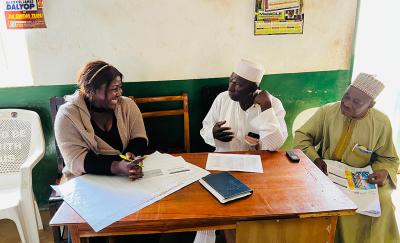Authors
Sujan Karki, Margaret Chappell, Ben Johns, and Sarah E.K. Bradley, Abt Global
Private providers are an important source of family planning (FP) in low- and middle-income countries. On average in 36 low- and middle-income countries, one in three modern contraceptive users obtains their method from a private source. Similarly, in Nepal, the private sector is an important source of modern contraception, with 25 percent of modern contraceptive users relying on the private sector for their methods. Forty-one percent of oral contraceptive users and 26% of injectable users obtain their method from private sources.
The Abt-led Sustaining Health Outcomes through the Private Sector (SHOPS) Plus project worked in Nepal from 2016 to 2021 to improve access to and quality of family planning services, including contraceptives. SHOPS Plus, the U.S. Agency for International Development’s (USAID) flagship private sector health initiative, did so by building the technical capacity and financial sustainability of Nepal CRS Company (CRS), a leading Nepalese social marketing organization and key USAID partner.
Licensing pharmacists to administer injectable contraceptives is a promising strategy to address the lack of health care workers trained and licensed to provide family planning globally. However, few countries have formally changed their policy. CRS’s Sangini private pharmacy network, with more than 3,400 outlets, is the first and only private pharmacy network in Nepal licensed to provide injectables. These pharmacies provide a key access point to obtain short-acting methods for those who lack access through the public sector or prefer the private sector.
To improve CRS’s training and supervision programs for networked pharmacies, SHOPS Plus assessed gaps between pharmacists’ knowledge and practices. SHOPS Plus compared the performance of Sangini pharmacists in CRS-led technical support visits, when providers were aware of being observed, with mystery client visits, when providers were not aware of being observed. We also assessed how well Sangini providers counseled on injectables and compared counseling on injectables with counseling for oral contraceptives. To our knowledge, this is the first study that examines this issue for pharmacist provision of injectable contraception.
We found high levels of adherence to training guidelines on counseling for injectables and oral contraceptives. However, we identified significant differences between pharmacists’ understanding of what they should do and what they actually do in practice, referred to as the know-do gap. The areas where we found gaps were in providing privacy, assessing client needs, and determining medical eligibility for hormonal methods.
With SHOPS Plus support, CRS took several steps to narrow the know-do gap through its programming, which may be a useful example for other countries as they expand the role of pharmacies in family planning service provision. Despite highlighting several areas for improvement, the findings show that Sangini providers know how to and practice appropriate counseling on both injectable and oral contraceptives. This suggests that pharmacists can successfully expand their family planning offerings and equip clients with the information needed to select an appropriate method of their choice.
With many countries considering expanding the role of pharmacies in FP service provision, especially to provide injectables, there is a growing need to explore models like the Sangini network and ways to use supportive supervision and training to improve service quality.



